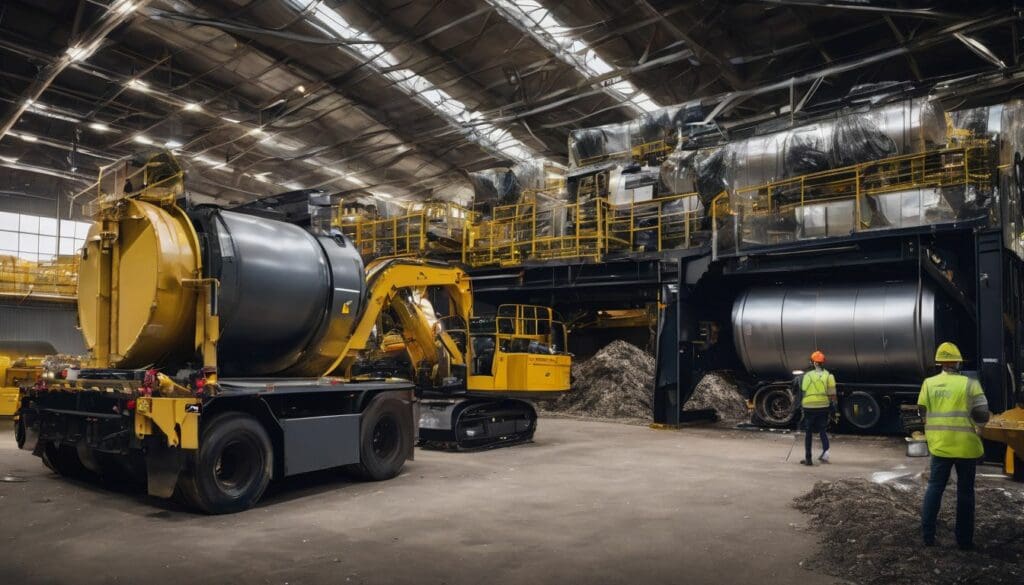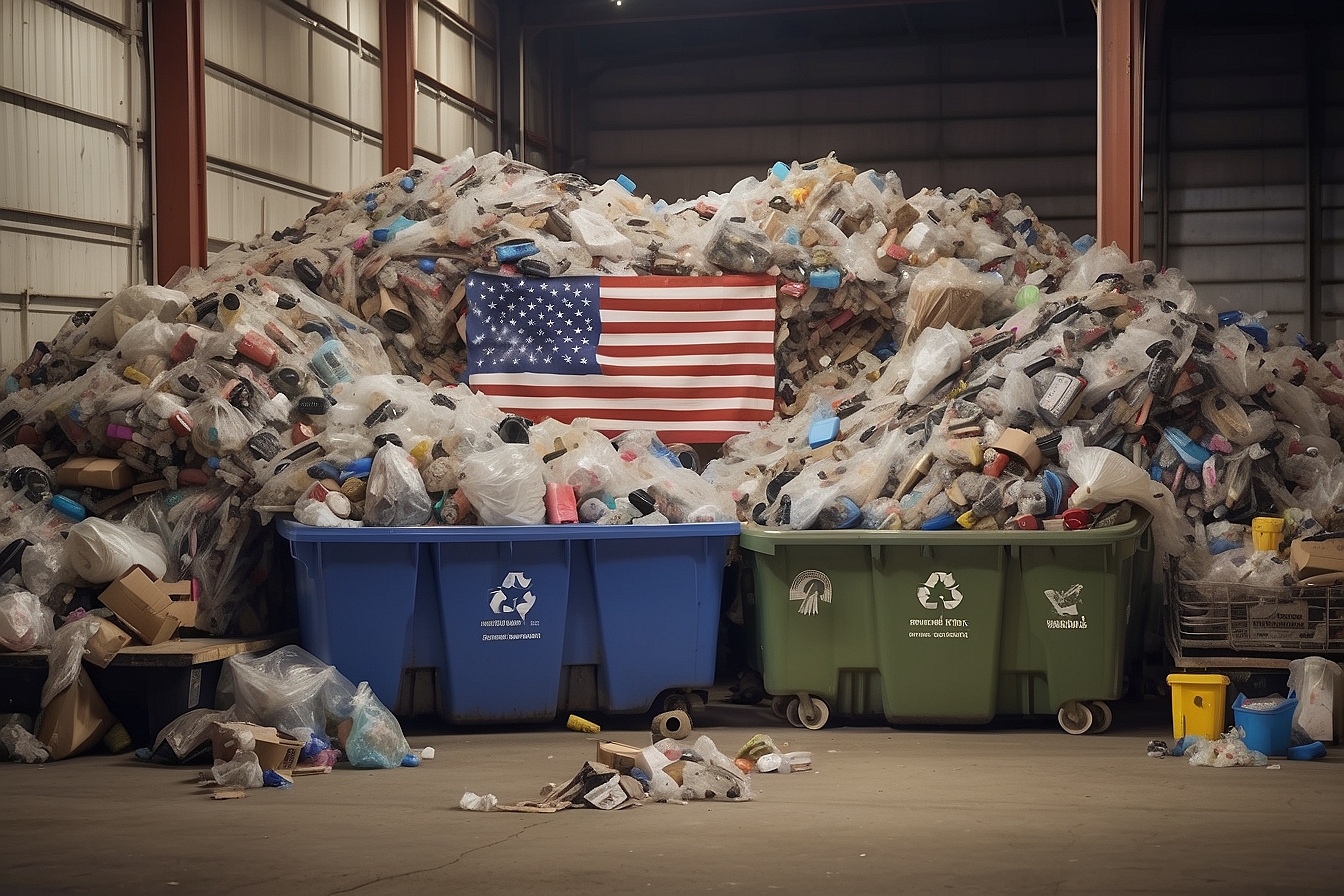Confronting the mountain of waste that accumulates day by day can indeed be a formidable task. Just like you, we’ve locked eyes with bins brimming over with rubbish and have been acutely aware of the duty we owe to our dear Earth.
It’s quite staggering when you think about it – households across the UK producing upwards of 26 million tonnes of waste each year! But don’t fret; we’re on hand to navigate you through state-of-the-art advancements and approaches in waste management that are set to transform how we approach the three Rs: reduce, reuse, and recycle.
Together, let’s embrace these innovations for a brighter, cleaner future!
Key Takeaways
- AI – driven sorting systems and smart waste bins are at the forefront of recycling technology, making it quicker and more efficient to recycle materials.
- Biodegradable packaging is gaining popularity as a sustainable option that reduces environmental damage caused by traditional plastics.
- The principles of the circular economy encourage designing products for longer use and embracing strategies to reduce waste generation overall.
- Government policies like tax incentives and Extended Producer Responsibility laws are essential for promoting responsible waste management practices.
- Adopting zero waste strategies involves community efforts, such as composting organic matter and choosing reusable items to minimise landfill contributions.
Innovations in Recycling Technologies
AI-driven sorting systems and smart waste bins are revolutionising the way we handle recyclable materials, making the process more efficient and effective. Biodegradable packaging solutions are also gaining traction as a sustainable alternative to traditional single-use plastics, driving innovation in the recycling industry.
AI-driven sorting systems
We’re revolutionising recycling with AI-driven sorting systems that efficiently separate waste materials. These innovative machines use sensors and learning algorithms to recognise and categorise different types of recyclables faster than ever before.
They can tell apart plastics, metals, paper, and glass with impressive accuracy. This means less contamination in recycling streams and higher quality recycled products.
Imagine a world where sorting waste is not our worry because smart technology does it for us. As we embrace these autonomous operations, we see a dramatic improvement in our recycling rates.
These systems are key to a sustainable future as they support circular economy principles by maximising resource recovery. Their precision reduces the need for new raw materials, cutting down on environmental impact and moving us closer to zero waste goals.
Biodegradable packaging solutions
Moving on from AI-driven sorting systems, another innovative solution making waves in waste management is the adoption of biodegradable packaging solutions. Embracing eco-friendly materials like plant-based plastics, compostable packaging, and recyclable paper products can significantly reduce waste and minimise environmental impact.
Companies are increasingly recognising the importance of sustainable packaging options to contribute to a greener future. By supporting these initiatives, we take a crucial step towards conserving natural resources, cutting down on pollution, and promoting a circular economy.
Innovations such as biodegradable packaging solutions align with our commitment to sustainability and waste reduction. Opting for these environmentally friendly alternatives not only reduces our carbon footprint but also supports renewable resource usage.
Smart waste bins
Smart waste bins use digitalisation and AI-driven sorting to revolutionise waste management. These bins automatically sort recyclables from general waste, making it effortless for individuals to dispose of their items correctly.
Additionally, smart waste bins can notify collection services when they are full, optimising collection routes and reducing emissions. With the integration of these eco-friendly innovations into our communities, we move closer to a more sustainable future.
Implementing smart waste bins across urban areas helps minimise contamination in recycling streams while encouraging responsible disposal habits among residents. By streamlining waste sorting processes through technological advancements, municipalities can significantly improve their recycling rates and contribute to environmental conservation efforts.
Strategies for a Sustainable Future
In order to achieve a sustainable future, it is essential to embrace circular economy principles, implement zero waste strategies, and enact effective policy and regulatory measures.
These strategies will play a crucial role in reducing waste and promoting eco-friendly practices for the betterment of our environment.
Circular economy principles
Circular economy principles aim to minimise waste and maximise the value of resources. This involves designing products for durability, reuse, and recycling, reducing the consumption of finite resources while promoting sustainability.
By embracing circular economy principles in our daily lives, we can contribute to a more sustainable future by extending the lifespan of products through repair and refurbishment.
Embracing circular economy principles means transitioning from a linear “take-make-dispose” model to a regenerative system that keeps materials at their highest utility and value at all times.
Zero waste strategies
Transitioning from circular economy principles to zero waste strategies, we can further our sustainability efforts by implementing effective waste reduction methods. By embracing the concept of reducing, reusing, and recycling, we can significantly minimise the amount of waste generated in our communities.
Implementing composting initiatives for organic waste and investing in innovative technologies such as waste-to-energy systems can help us divert a substantial portion of our waste from landfills.
Encouraging the use of eco-friendly products and packaging solutions also plays a crucial role in achieving zero waste goals.
Embracing conscious consumerism is vital in our journey towards zero waste living. Through mindful purchasing decisions and actively seeking out package-free alternatives or reusable options, we can greatly reduce our environmental footprint.
Policy and regulatory measures
Policy and regulatory measures play a crucial role in shaping the future of waste management. These measures provide a framework for promoting sustainable practices and holding businesses and individuals accountable. They also encourage innovation and investment in eco-friendly technologies.
- Incentivising sustainable practices: Governments can offer tax incentives and subsidies to businesses that adopt green waste management practices, such as recycling, composting, and using renewable energy for waste-to-energy processes.
- Extended Producer Responsibility (EPR) laws: EPR laws require manufacturers to take responsibility for the entire lifecycle of their products, including proper disposal or recycling at the end of their usefulness. This encourages product design with reusability and recyclability in mind.
- Waste management regulations: Strict enforcement of waste management regulations ensures that businesses comply with standards for waste reduction, recycling, and safe disposal, reducing environmental pollution.
- Public awareness campaigns: Government initiatives can raise awareness about responsible waste management practices through educational programmes, community outreach, and public service announcements.
- Collaborative international agreements: International cooperation through agreements on waste management can help address cross-border challenges such as e-waste disposal and plastic pollution in oceans, fostering a united approach towards global environmental sustainability.
Conclusion
Innovative recycling technologies, such as AI-driven sorting systems and biodegradable packaging solutions, are transforming waste management. Smart waste bins equipped with advanced technology are revolutionising the way we handle waste.
Embracing circular economy principles and zero waste strategies will pave the path for a sustainable future. Policy and regulatory measures play a crucial role in driving these innovations towards an eco-friendly tomorrow.
FAQs
1. What are some innovations in waste management for the future?
Innovations in waste management include waste-to-energy technologies that turn rubbish into power and AI-driven sorting systems to separate recyclables effectively.
2. How does AI-driven sorting change waste management?
AI-driven sorting uses smart systems to quickly identify and sort different types of waste, making recycling processes more efficient and accurate.
3. Will we still need landfills with waste-to-energy technologies?
While waste-to-energy technologies can significantly reduce the amount of rubbish sent to landfills, they don’t eliminate the need for them entirely as not all materials are suitable for these processes.
4. Can new strategies ensure sustainable waste handling?
Future strategies aim to make waste handling more sustainable by utilising innovative techniques like converting waste into energy and implementing advanced recycling methods powered by artificial intelligence.





